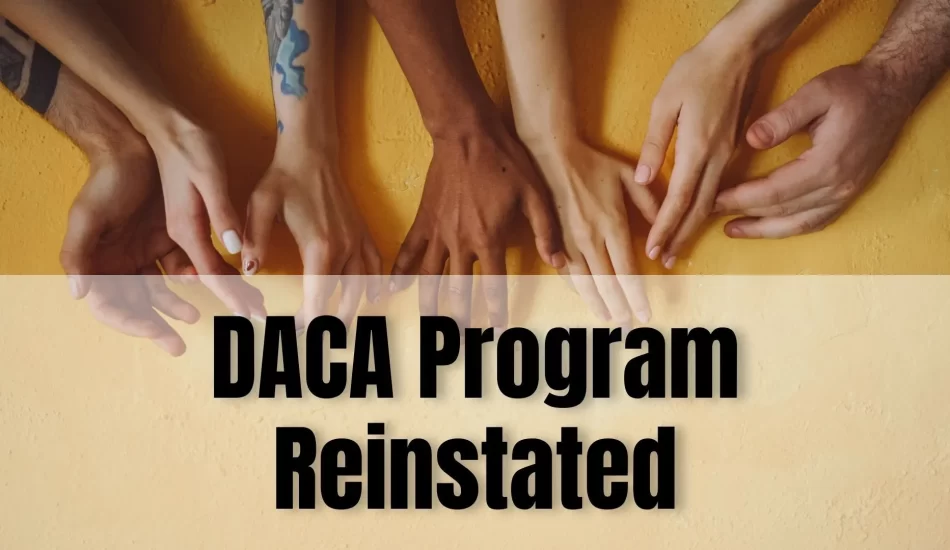Judge Orders USCIS to Reinstate DACA Program

In compliance with a recent federal court order, on Monday December 7, 2020, the Trump administration reinstated the Deferred Action for Childhood Arrivals (DACA) program. It has been an uncertain four years for DACA recipients as President Trump worked hard to prove the unconstitutionality of the immigration policy that was created under the Obama administration in 2012. The Obama-era program allows immigrants who were brought to the United States as children to apply for temporary permission to remain lawfully in the United States. This federal court ruling is a win for these undocumented immigrants and will open doors for many thousand more to apply.
Updated Policy Guidelines
On Monday, U.S. Citizenship and Immigration Services (USCIS) released the new application updates for those considering applying for DACA for their first time and for DACA renewal applicants, known as Dreamers. According to the updated policy guidelines, USCIS will be accepting DACA renewal requests and applications for advance parole documents based on the terms of the DACA policy before September 5, 2017. Advance parole allows DACA recipients to travel internationally and return to the United States lawfully. USCIS will also be extending one-year grants of deferred action and one-year employment authorization documents under DACA for two years.
The DACA program back in full effect is a victory not only for immigrants and their families, but also for all American citizens. Dreamers contribute to all sectors in the United States as frontline health care workers, agricultural workers, university students, business owners, and more. With this immigration program, we can protect over 600,000 to 800,000 more Dreamers who have demonstrated their significant ties to the United States and proven that they are hard-working, law-abiding members of their community.
Applicants should review the following questions to determine their eligibility to apply:
- Were you under 31 years of age as of June 15, 2012?
- Did you come to the United States before your 16th birthday?
- Have you continuously resided in the United States from June 15, 2007 to the present?
- Were you present in the United States on June 15, 2012 and at the time of making your request for consideration of deferred action with USCIS?
- Did you have no lawful status in the United States on June 15, 2012? Either because
1. You never had a lawful immigration status, neither on nor before June 15, 2012
2. The lawful immigration status or parole that you obtained prior to June 15, 2012 had expired as of June 15, 2012
- Are you currently in school, have graduated or obtained a certificate of completion from high school, have obtained a general educational development (GED) certificate, or are an honorably discharged veteran of the U.S. Armed Forces or U.S. Coast Guard?
- Have you not been convicted of a felony or a significant misdemeanor?
DHS Declared Final Rule
The Department of Homeland Security’s final rule on DACA went into effect on October 31, 2022. This new rule presents the Deferred Action for Childhood Arrivals (DACA) policy.
This is a formal effort by the Biden Administration to empower the lawful underpinnings of DACA. This rule does not offer any changes to who qualifies for DACA, nor does it reopen DACA to first-time individuals. There are no provisions to protect DACA from legal challenges.
Current DACA recipients who are eligible to renew should continue renewing and not let their status lapse. For more information, consult with a seasoned immigration lawyer.
What Is In The Rule?
The Deferred Action for Childhood Arrivals final rule covers five key points
- Original 2012 eligibility guidelines are neither expanded nor changed
- Clarifies that DHS will automatically decline work authorization/EAD validity if someone’s DACA grant is declined
- Provides formal definition of “deferred action”
- Clarifies that DACA recipients are considered “lawfully present” (but do not possess a “lawful immigration status”)
- Process for requesting DACA remains the same, as does the total cost ($495); however, the $85 biometrics fee has been replaced with an $85 DACA application fee. The employment authorization fee ($410) remains the same.
Due to the ongoing court proceedings, USCIS is accepting applications to process DACA renewals under the new rule but cannot process first-time applicants. On October 14, 2022, Judge Hanen of the U.S. District Court for the Southern District of Texas stated that USCIS cannot work on and grant new, first-time DACA applications, under the new rule.
The rule does not offer any significant changes to DACA eligibility, protections, or the process for application. Current eligible DACA recipients are permitted to renew, but the government is still prohibited from processing new, first-time applications, under court order.
Insights About DACA Recipients
Without the threat of removal, eligible young adults can attend school, work legally, and plan their lives. Additionally, DACA holders enjoy greater upward mobility. They get better working conditions, better-paying jobs, better education, and more.
As of June 30, 2021, there were 590,070 active DACA recipients, with another 984,413 pending renewal. Some other demographics:
- 47% males, 53% females
- Average age of 27
- Texas and California have the most DACA recipients
- The most common countries of origin include Mexico, South Korea, Peru, El Salvador, Honduras, Guatemala, and Brazil.
- Many DACA holders are considered important critical infrastructure workers who serve in the education, healthcare, and food-related industries.
Talk to An Experienced Immigration Lawyer
USCIS is still accepting and processing renewal applications. If you or your loved one is a current DACA recipient and are eligible to renew their status, consider doing so. If DACA requirements leave you confused, reach out to our team of immigration lawyers. With offices in Portland, Oregon, Los Angeles, California, and Seattle, Washington, we offer counseling on an array of immigration law concerns across the country.
For additional information on how we can help you qualify for and obtain an EB-5 Green Card, contact (503) 427-8243 or you schedule a consultation here.
